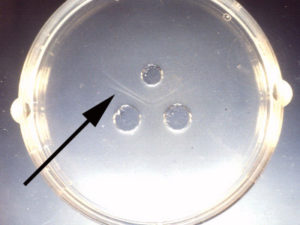 A diagnostic test using serum (the fluid, non-cellular part of blood) that detects antibody produced in response to infection. Serum is placed in a well in the agar and a MAP antigen preparation is placed in a nearby well. These two test components passively diffuse out of the well into the agar. If the serum sample contains antibodies to antigens of MAP they bind, forming an interlaced antigen-antibody complex that precipitates in the agar. The precipitate is visible to the unaided eye as a thin white line. This same technology is used for diagnosis of other diseases. The test is best interpreted by using a known positive control serum sample (provided in commercial kits) in the assay for comparison. This test has largely been replaced with more sensitive ELISA technology and commercial AGID kits for Johne’s disease are no longer available (in the US).
A diagnostic test using serum (the fluid, non-cellular part of blood) that detects antibody produced in response to infection. Serum is placed in a well in the agar and a MAP antigen preparation is placed in a nearby well. These two test components passively diffuse out of the well into the agar. If the serum sample contains antibodies to antigens of MAP they bind, forming an interlaced antigen-antibody complex that precipitates in the agar. The precipitate is visible to the unaided eye as a thin white line. This same technology is used for diagnosis of other diseases. The test is best interpreted by using a known positive control serum sample (provided in commercial kits) in the assay for comparison. This test has largely been replaced with more sensitive ELISA technology and commercial AGID kits for Johne’s disease are no longer available (in the US).